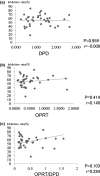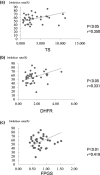Intratumoral gene expression of dihydrofolate reductase and folylpoly-c-glutamate synthetase affects the sensitivity to 5-fluorouracil in non-small cell lung cancer
- PMID: 35201464
- PMCID: PMC8777502
- DOI: 10.1007/s12672-021-00413-w
Intratumoral gene expression of dihydrofolate reductase and folylpoly-c-glutamate synthetase affects the sensitivity to 5-fluorouracil in non-small cell lung cancer
Abstract
Background: Various factors related to the sensitivity of non-small cell lung carcinoma (NSCLC) to 5-fluorouracil (5-FU) have been reported, and some of them have been clinically applied. In this single-institutional prospective analysis, the mRNA expression level of five folic acid-associated enzymes was evaluated in surgical specimens of NSCLC. We investigated the correlation between the antitumor effect of 5-FU in NSCLC using an anticancer drug sensitivity test and the gene expression levels of five enzymes.
Materials and methods: Forty patients who underwent surgery for NSCLC were enrolled, and the antitumor effect was measured using an in vitro anticancer drug sensitivity test (histoculture drug response assay) using freshly resected specimens. In the same sample, the mRNA expression levels of five enzymes involved in the sensitivity to 5-FU were measured in the tumor using real-time PCR. The expression levels and the result of the sensitivity test were compared.
Results: No correlation was found between dihydropyrimidine dehydrogenase (DPD), orotate phosphoribosyltransferase (OPRT), or DPD/OPRT expression and the antitumor effects of 5-FU. On the other hand, a correlation was found between thymidylate synthase (TS), folylpoly-c-glutamate synthetase (FPGS), and dihydrofolate reductase (DHFR) expression and 5-FU sensitivity.
Conclusion: Expression of FPGS and DHFR may be useful for predicting the efficacy of 5-FU-based chemotherapy for NSCLC.
Keywords: Dihydropyrimidine dehydrogenase; Histoculture drug response assay; Orotate phosphoribosyltransferase; Reverse-transcriptase polymerase chain reaction; Thymidylate synthase.
© 2021. The Author(s).
Conflict of interest statement
The authors declare that they have no competing interests.
Figures


References
-
- Yoshioka H, Okamoto I, Morita S, et al. Efficacy and safety analysis according to histology for S-1 in combination with carboplatin as first-line chemotherapy in patients with advanced non-small-cell lung cancer: updated results of the West Japan Oncology Group LETS study. Ann Oncol. 2013;24(5):1326–1331. doi: 10.1093/annonc/mds629. - DOI - PubMed
-
- Ichikawa W, Uetake H, Shirota Y, et al. Both gene expression for orotate phosphoribosyltransferase and its ratio to dihydropyrimidine dehydrogenase influence outcome following fluoropyrimidine-based chemotherapy for metastatic colorectal cancer. Br J Cancer. 2003;89:1486–1492. doi: 10.1038/sj.bjc.6601335. - DOI - PMC - PubMed
LinkOut - more resources
Full Text Sources
